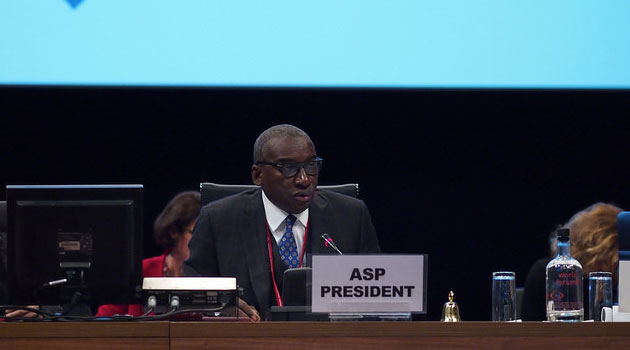NAIROBI, Kenya, Nov 21 – The Assembly of States Parties (ASP) bureau will on Tuesday submit a report on Kenya’s request on Rule 68 and audit of conduct of the International Criminal Court (ICC) prosecution.
The bureau is expected to refer the proposal on the two issues to the ASP technical committee for drafting.
On Saturday, the Kenyan delegation at The Hague was still lobbying the 18 members of the bureau as it reviews the issues forwarded to them on Friday.
The current bureau took up its functions during the 14th session of the ASP.
It consists of a President, Sidiki Kaba (Senegal), two Vice Presidents, Alvaro Moerzinger (Uruguay) and Sebastiano Cardi (Italy) and 18 members elected by the Assembly for a three-year term.
Member countries include Chile, Colombia, Costa Rica, Czech Republic, Germany, Ghana, Hungary, Japan, Netherlands, Nigeria, Republic of Korea, Romania, Samoa, Slovenia, South Africa, Sweden, Uganda and United Kingdom.
During Tuesday’s plenary, Kenya received support from African and South African countries.
Most of the European countries opposed Kenya’s requests and concurred with the civil society groups which have argued that there is no problem applying Rule 68 on the Kenyan case.
They have argued that Rule 68 can be applied same as Rule 134 quarter which exempts sitting Heads of State from continuous presence during trial.
Rule 68 worked to the advantage of the prosecution which was allowed to use prior recorded statements of five recanting witnesses.
Rule 134 quarter has on the other hand worked to the advantage of Ruto who was exempted from continuous physical presence during his trial.
The defence in their application seeking for a reversal of the decision of the trial chamber argued that the amendment passed during the 12th Session of the ASP in 2013 was not to be applied retrospectively.
They also complained that it would infringe on the rights of the accused since there would be no opportunity to cross-examine statements made by the five witnesses.
Of concern was the credibility and reliability of recorded statements which the defence teams have contested several times since the ICC case commenced.
They have alleged that the prosecution witnesses agreed to testify in exchange of goodies offered by the court which included relocation and better life outside Kenya.
ICC prosecutor Fatou Bensouda in her request to have prior recorded statements of six witnesses admitted explained to the judges that the statements would give the judges the full picture of the happenings of the 2007/2008 Post Election Violence.
She has also argued that her witnesses were interfered with by being offered bribes and intimidated to withdraw their testimonies which she has also given as a reason for seeking admission of prior recorded statements of hostile witnesses who diverged from their primary evidence.
ICC has so far issued warrant of arrests against three Kenyans alleged to have interfered with prosecution witnesses.
Nine witnesses in the case against Ruto and Sang were compelled to testify after they told the court that they were no longer willing to testify.
Eight of them agreed to take stand and some of them recanted their evidence saying they had been bribed and coached by ICC officials to fix Ruto and Sang.
Others said they had been promised better lives abroad.
Some of the nine witnesses stuck to their initial statements and also made allegations that they had been bribed to recant their evidence.
But even as Kenya pushes for rejection of use of evidence of recanting witnesses based on rule 68 and its retrospectivity in the Kenyan case, Trial Chamber V (a) Presiding Judge Chile Eboe-Osuji in his partial concurring opinion said even without applying rule 68, there are other ways of admitting prior recorded statements.
In case the ASP gives Kenya its way and decides to do away with rule 68, could the ICC judges rely on other ways of using prior recorded statements based on the prosecutor’s allegations of witnesses interference?
Issues of credibility of witnesses and rights of the defence counsels to cross examine witnesses are also considerations in use of prior recorded evidence in guarding rights of the accused person.
Issues of how the prosecution procured witnesses and the case made by Kenya and defence teams of Ruto and Sang that the witnesses lacked credibility are also concerns that affects the decision to use prior recorded statements.










































